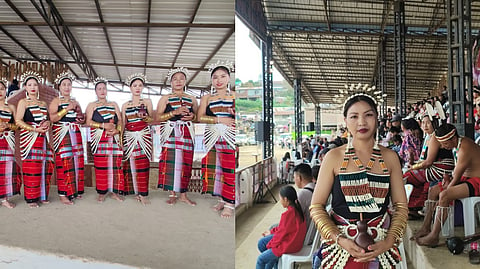

MANIPUR: A decade ago, Pamchuiwon Kashak, a 30-year-old woman from Ukhrul, a hill district in Manipur, began designing and crafting traditional Tangkhul Naga tribe jewellery — earrings, necklaces and other accessories using beads and glass stones. What started as a hobby soon transformed into a full-fledged business in 2019.
Pamchuiwon’s vision was clear: to revive the moribund tradition of Tangkhul jewellery, once popular among both men and women, but now largely confined to festivals and special occasions due to the growing influence of Western culture.
Five years after beginning her business from home, Pamchuiwon opened her first retail outlet, Tangkhul_beads, in Ukhrul in 2020. The shop, located in the heart of the Tangkhul community, quickly flourished.
Today, her customer base spans beyond Manipur, reaching cities such as Delhi and Mumbai, thanks to her social media presence on YouTube and Instagram, as well as her stall at the annual Shirui Lily Festival. The state-sponsored festival, dedicated to the iconic Shirui Lily flower, has played a crucial role in bringing her work to a broader audience. Pamchuiwon’s journey to success has been far from easy.
Born as the second of eleven siblings, she grew up in a poor family where daily survival was a struggle. When she was 9-years-old, her father died leaving behind her mother and six children to fend for themselves. As per his dying wish, her mother remarried his younger brother who too was a poor farmer. The family’s financial difficulties only increased after the birth of five more children.
Despite these hardships, Pamchuiwon vividly recalls walking long distances to work in the fields and helping her family make ends meet. “I was in Class 4 when I started working in the fields. I recall walking nearly 20 kilometers every day, 10 kilometers each way, to help out,” she says. With financial resources scarce, Pamchuiwon’s parents were often unable to pay her school fees on time, causing her to miss exams.
It was only when her grandfather, a Power Department employee, and other relatives stepped in that she was able to continue her education.
In Class 7, she moved to Ukhrul town to live with her grandfather, working in the fields for daily wages alongside her younger brother. The income earned from these odd jobs was used to fund their education and support their family. “My siblings and I never faced abuse at work because we had already become skilled workers from years of experience,” Pamchuiwon adds.
After completing her Class 12, Pamchuiwon moved to Imphal, the state capital, for her undergraduate studies in Arts, followed by a post-graduate degree in Mass Communication from Manipur University.
The years spent in Imphal were particularly tough as she struggled to fund her education, pay for rent and afford basic necessities in the expensive city. During her first year of college, she landed a government job on a contractual basis, but the work environment was hostile and Pamchuiwon, feeling unsupported and vulnerable due to her background, eventually quit.
“I knew I had to create my own path and I decided to pursue what I loved—making traditional jewellery,” she says, recalling the turning point in her life. “I didn’t look back after that.” Returning to Ukhrul after her post-graduation, Pamchuiwon focused entirely on her jewellery-making business. In 2020, she married Yaruihor Hungyo, whose support and inspiration have been invaluable to her. The couple’s indigenous wedding, which featured handmade jewellery and traditional attire, became a significant milestone in Pamchuiwon’s business, inspiring other couples to embrace their cultural roots on their wedding day.
“Many couples now wear traditional attire for their weddings, inspired by our ceremony,” Pamchuiwon shares with pride. For Pamchuiwon, her work is not just about making jewellery—it’s about reviving and preserving Tangkhul Naga culture. She proudly speaks of the beauty and value of traditional Tangkhul attire and accessories, which are often expensive and hard to find.
“I once couldn’t afford Tangkhul clothing, so I started making my own jewellery,” she explains. “Today, I create these traditional products not just for myself, but for my family and friends too.” As the owner of Tangkhul_beads, Pamchuiwon makes both traditional and modern jewellery for men and women, using glass, stone beads, and other materials such as bones. Her products are sold locally in Ukhrul and at festivals, as well as in cities like Delhi and Mumbai.
In addition to running her business, Pamchuiwon also employs four women from marginalised communities and involves her siblings in the business. Two of her siblings, Soreila and Mashunphi, work full-time with her.
Today, Pamchuiwon’s family is in a better financial position, with several siblings now employed, and her eldest brother supporting the education of five younger siblings.
“I may run a small business, but I feel I’ve achieved something,” she says, reflecting on her success. “In the future, I hope to train young people in jewellery-making.”
The marriage of Modernity & tradition
In 2020, she married Yaruihor Hungyo. The couple’s indigenous wedding, which featured handmade jewellery and traditional attire, became a significant milestone in Pamchuiwon’s business, inspiring other couples to embrace their cultural roots on their wedding day. “Many couples now wear traditional attire for their weddings, inspired by our ceremony,” Pamchuiwon shares with pride. Her work is not just about making jewellery—she proudly speaks of the beauty and value of traditional Tangkhul attire and accessories, which are often expensive and hard to find.